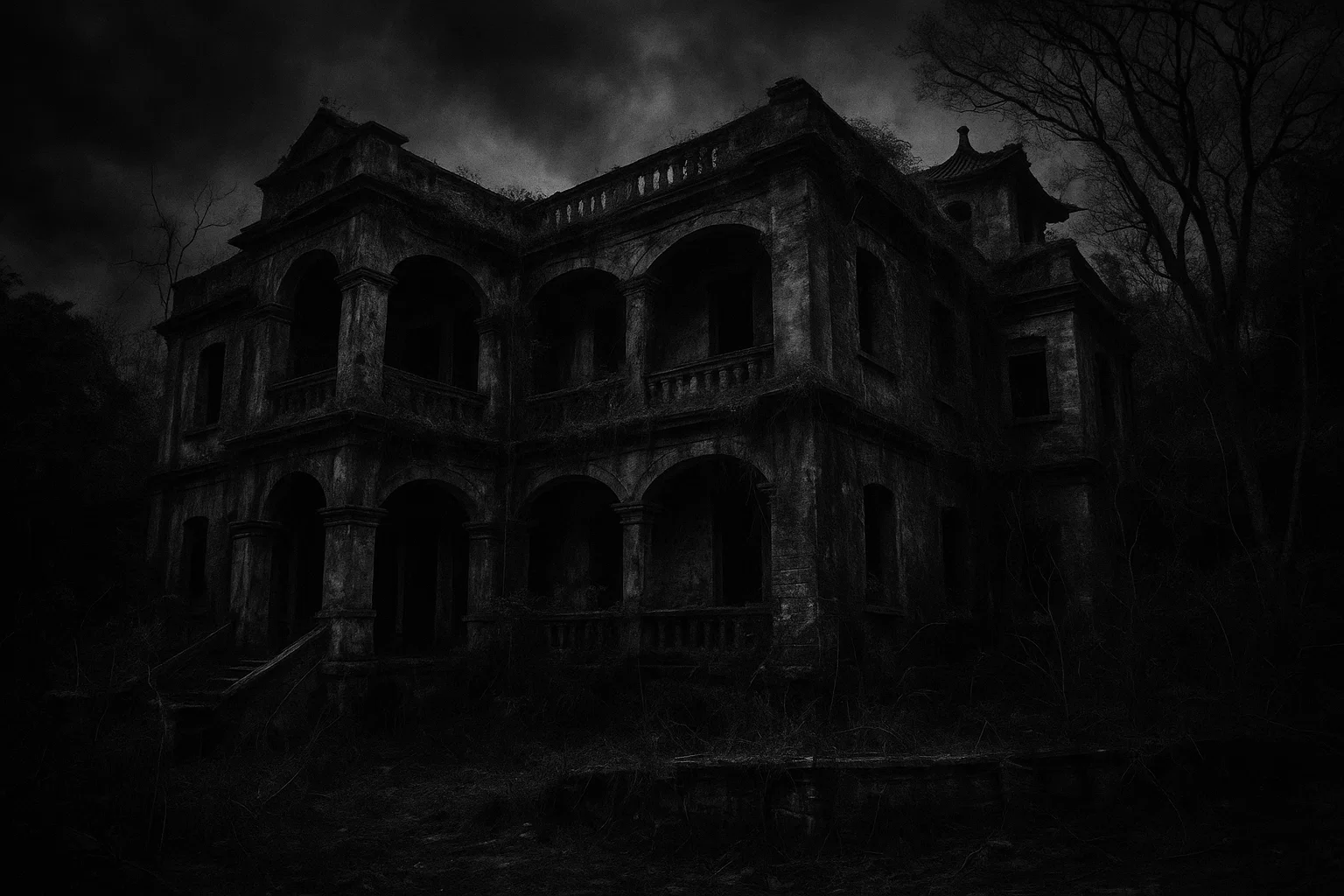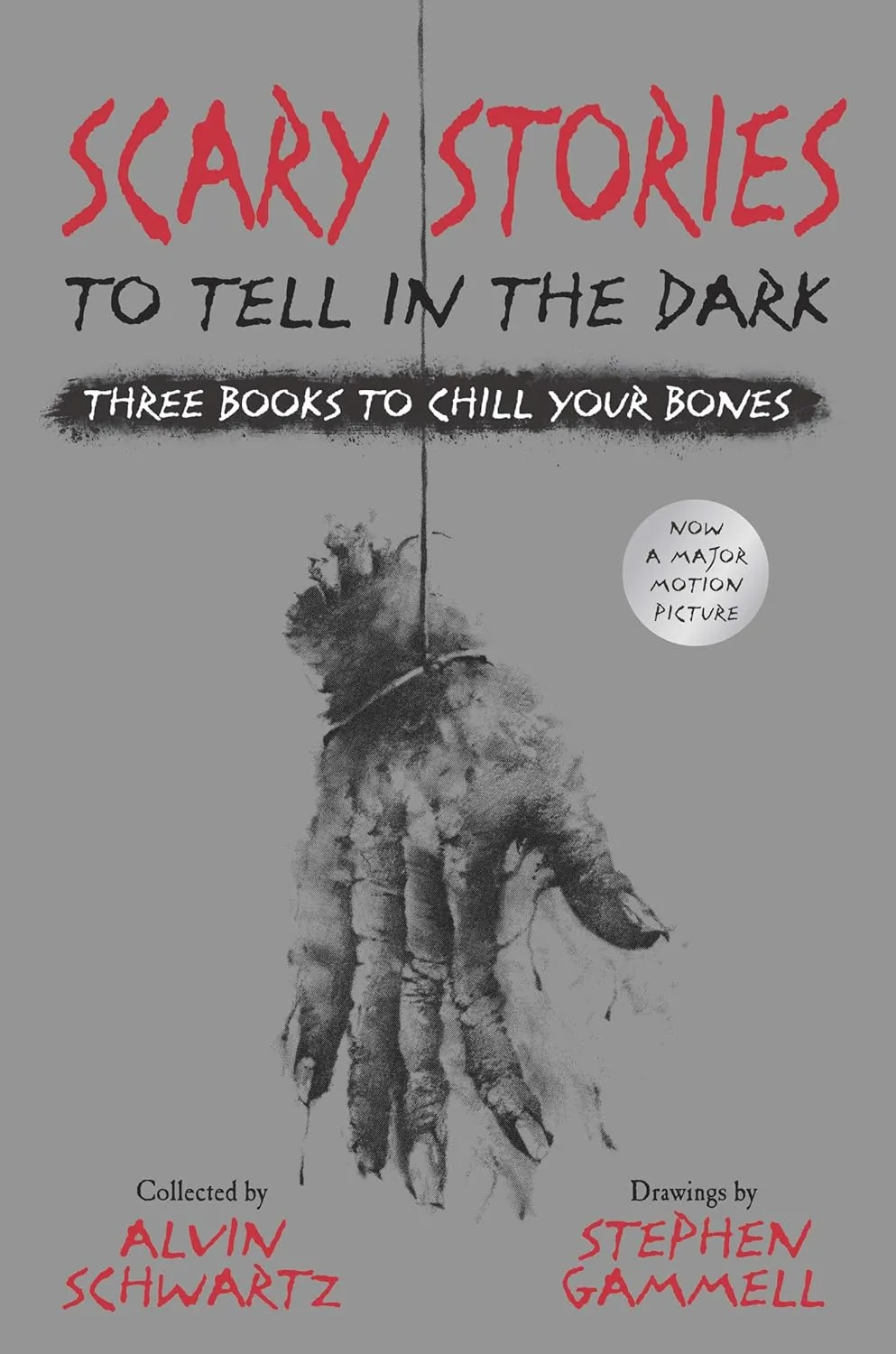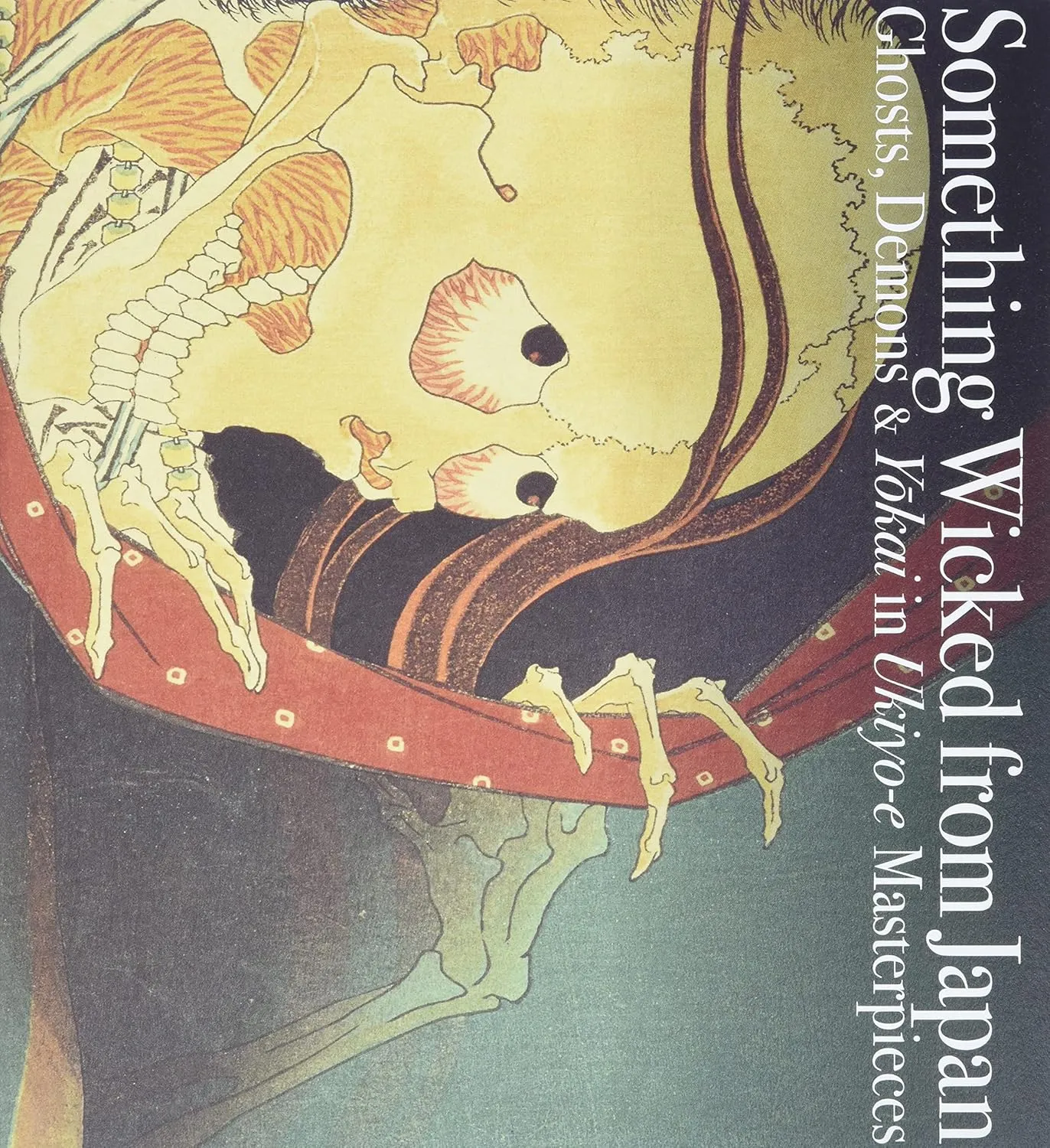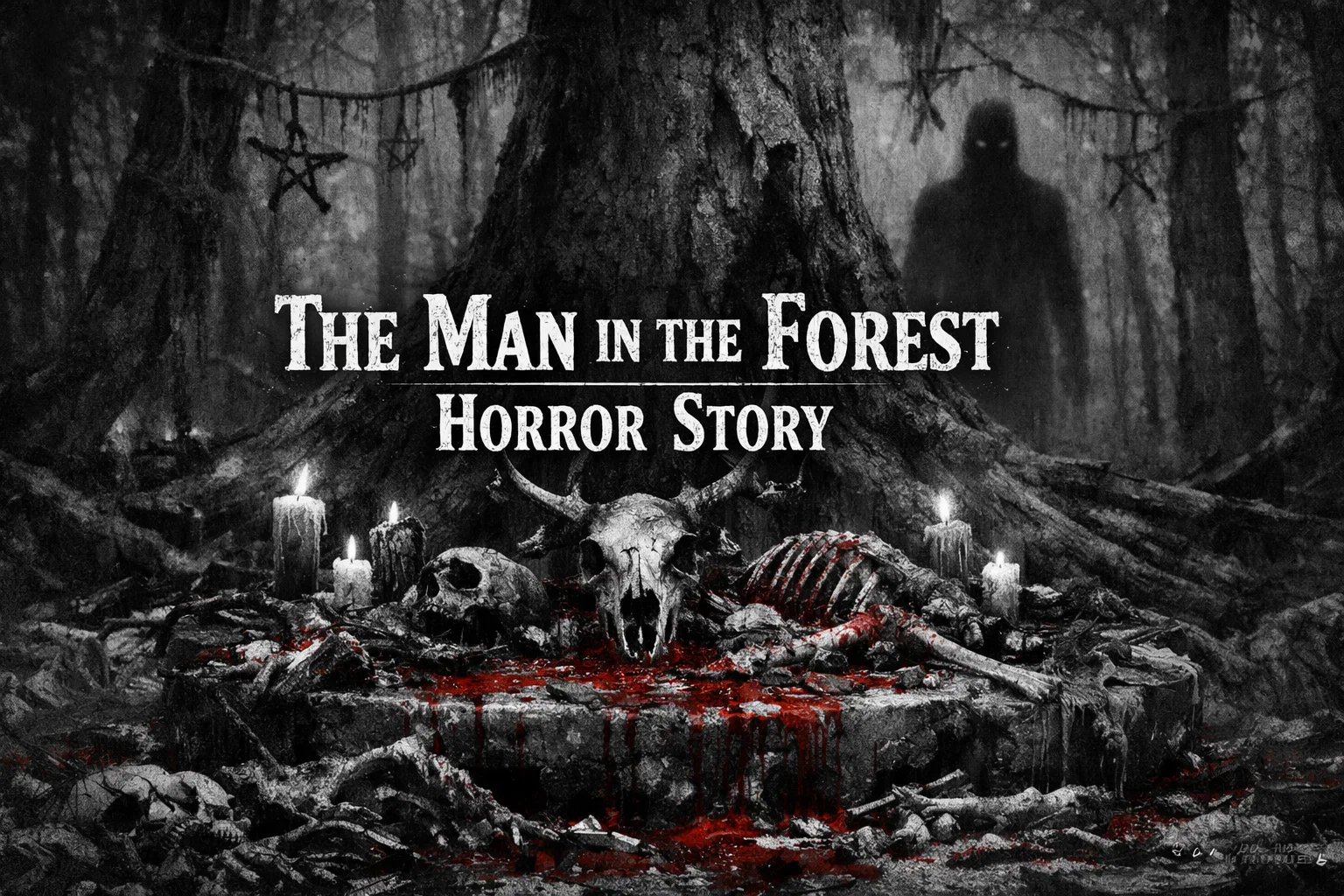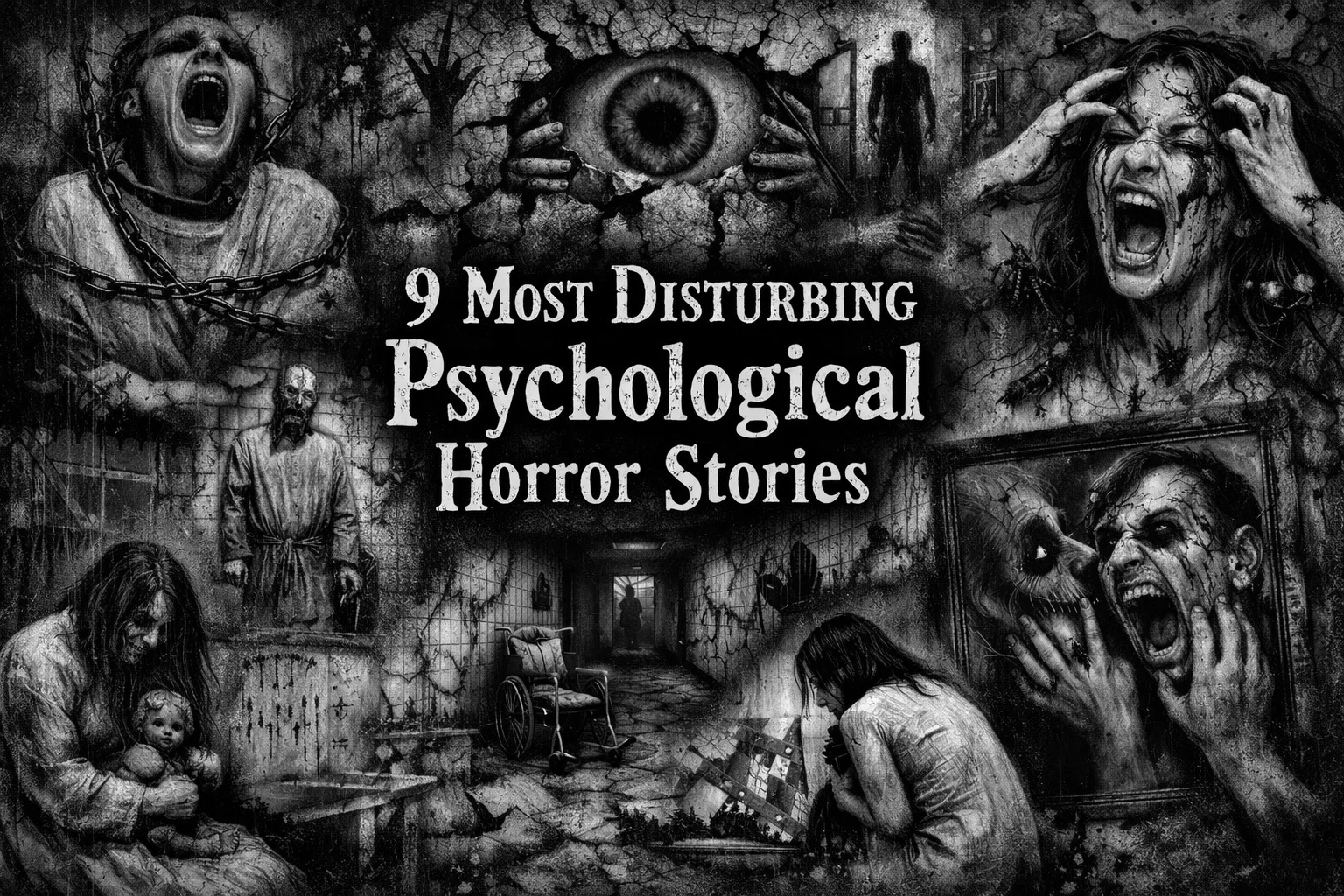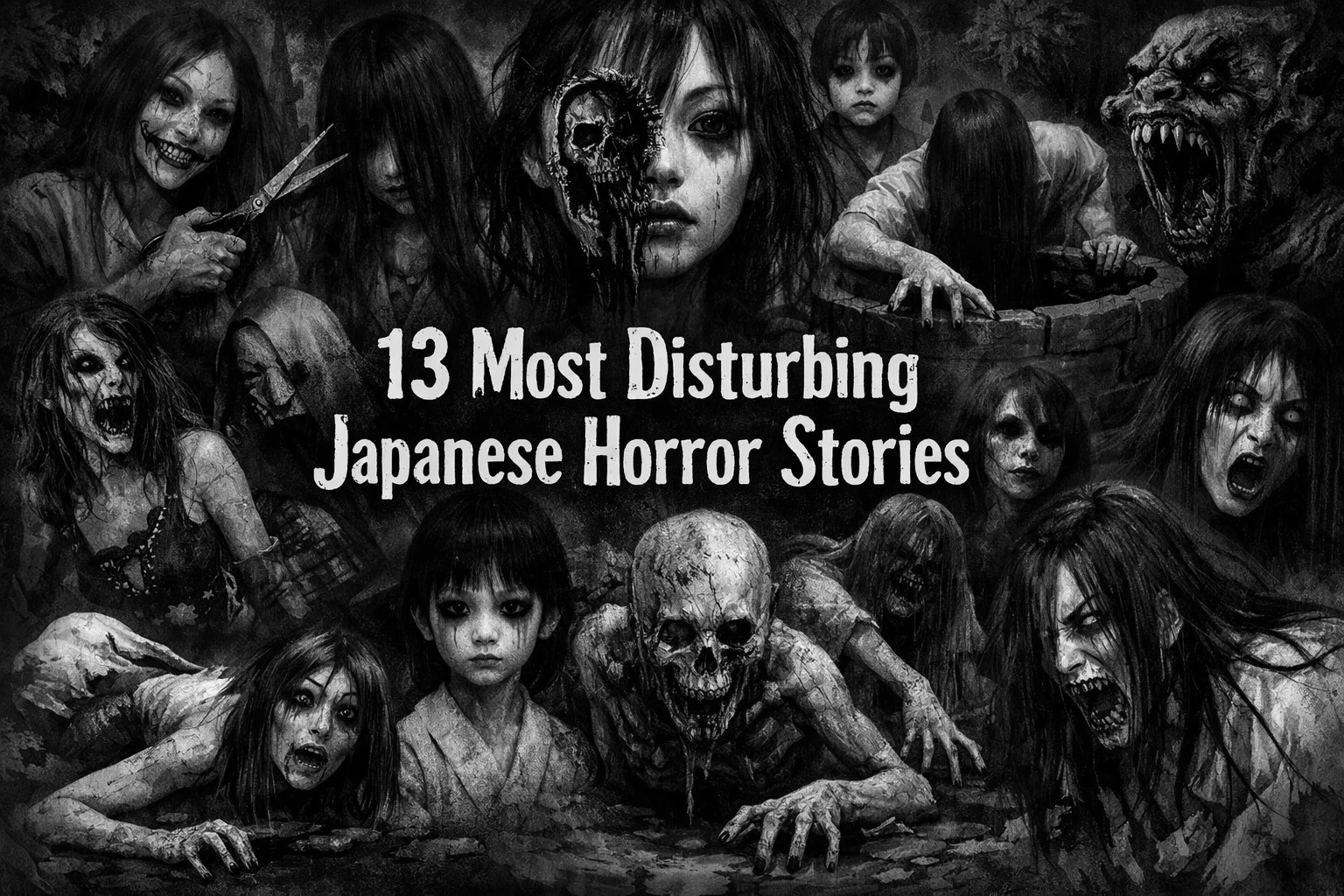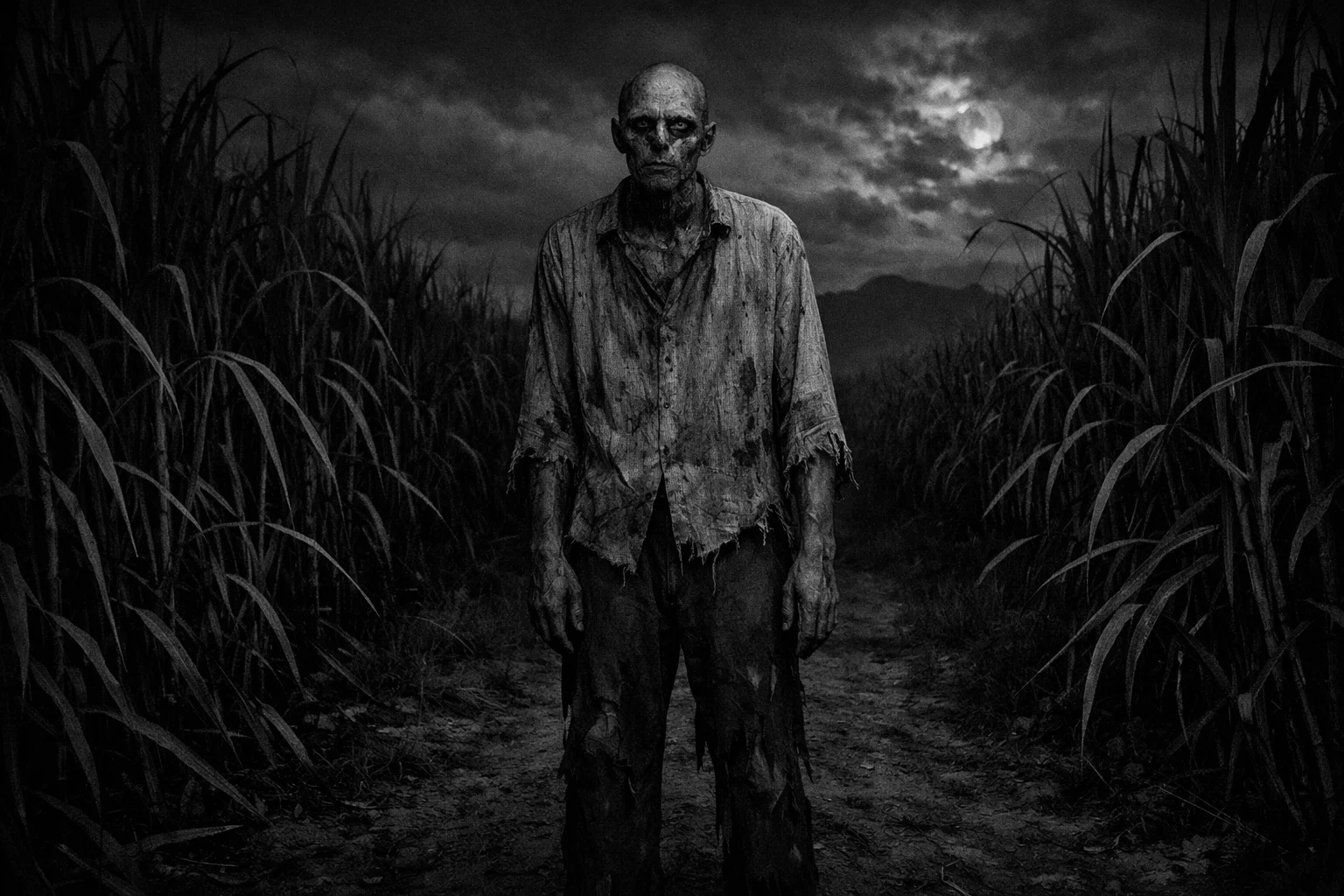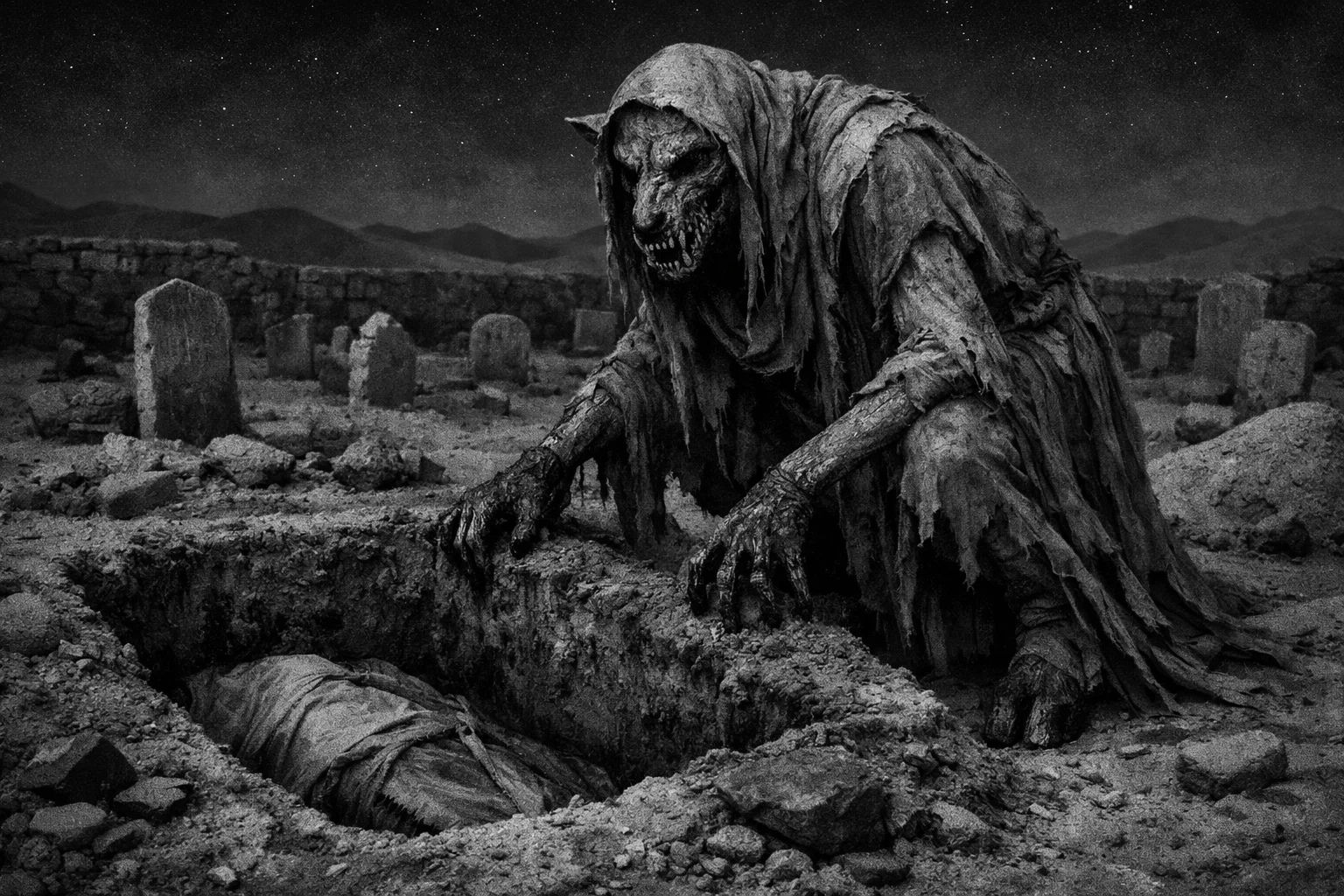This strange horror story is set in the decaying heart of Hong Kong’s Nam Koo Terrace, a notorious haunted mansion steeped in dark history. The “Curse of Nam Koo Terrace” horror story follows the fate of four teenagers drawn to the abandoned estate, lured by whispers of scary ghost stories and its gruesome past as a World War II “comfort house. As they explore the rotting halls, the air grows thick with dread, and the house’s sinister presence begins to unravel their minds. Blending psychological terror with visceral fear, this ghost story weaves a tapestry of suspense, leaving you questioning what’s real and what’s born from the shadows. Perfect for fans of terrifying horror stories and spooky tales that linger long after the final page.
The Wan Chai district of Hong Kong pulsed with life, its neon lights and crowded streets a bizarre contrast to the rotting husk of Nam Koo Terrace. Tucked away on Ship Street, the mansion stood like a wound in the city’s flesh, its red-brick walls crumbling under decades of neglect.
Built between 1915 and 1921 by To Chun-man, a Shanghainese silk magnate, it was once a shining example of wealth, its Colonial arches and Chinese tiled roofs a a perfect example to ambition. But ambition turned to ash during World War II, when Japanese soldiers seized the house, transforming it into a “comfort house”—a brothel where young women were tortured, raped, and left to die in its shadowed rooms.
Locals spoke of over a hundred deaths, their screams seeping into the walls. After the war, the To family’s return was cursed by suicides and accidents, each death shrouded in whispers of flickering lights, cold spots, and shapes moving in the dark.
By 2025, Nam Koo Terrace was a fenced-off ruin, owned by Hopewell Holdings, its rusted signs snarling: Nam Koo Terrace. Do Not Pass! Hazardous area.
Warning: Do NOT Read This Collection Alone After Midnight
Limited-Time: Volume 1 for FREE!
Real reader reviews: “Had to sleep with the lights on for a week,” “Story #17 still makes me afraid of the dark,” “I finished Volume 1 and immediately bought the next 20.” Over 30 original short horror masterpieces designed to make you terrified of perfectly ordinary things.
The mansion’s infamy was a siren call for Mei-Ling Cheung, a 17-year-old with a hunger for the macabre.
Mei-Ling was a storm of contradictions: bold yet broken, her sharp wit hiding the grief of her mother’s death two years prior—a car accident that left her chasing thrills to outrun the pain. Her dyed purple hair and ripped jeans screamed rebellion, but her late-night journal entries revealed a girl terrified of being alone. Her best friend, Kai Wong, was her anchor.
At 16, Kai was a wiry bundle of nerves, his history-teacher father drilling into him a love for facts over folklore. His asthma flared under stress, and his glasses fogged when he panicked, which was often. Kai’s secret shame was his cowardice; he’d frozen when bullies cornered him last year, and the memory gnawed at him.
The group was completed by twins Hana and Haru Tanaka, 17, whose Japanese heritage made Nam Koo Terrace’s history a personal wound. Hana was a wildfire—artistic, impulsive, her sketchbook a gallery of grotesque creatures born from nightmares.
Haru was her shadow, reserved and introspective, his calm facade masking a fear of his own anger, a trait he’d inherited from their abusive grandfather.
The four had grown up on stories of Nam Koo Terrace, its legend cemented by a 2003 incident that haunted Hong Kong’s collective memory. Eight middle school girls had snuck into the mansion on a dare, seeking paranormal proof.
What followed was chaos: three were found in the basement, covered in self-inflicted wounds, speaking in tongues; three others were dead on the first floor, their bodies posed like macabre dolls—one at a table, one in bed, one behind a door. The story, splashed across Oriental Daily, became a warning, its details warped by blogs and whispers.
What If the Scariest Children’s Book Ever Written Was Never Meant for Children?
Limited-Time: Up to 51% OFF!
Alvin Schwartz collected these stories from graveyards, backroads, and old people who swore they were true – then paired them with Stephen Gammell’s grotesque, dripping, eyeless illustrations that look like they crawled off the page. Three complete books of pure nightmare fuel in one volume.
Mei-Ling was obsessed. “It’s our turn,” she declared one October evening in 2025, sprawled on Kai’s bedroom floor, her phone glowing with articles about the mansion. “Halloween night. We go in, we explore, we prove it’s real.”
Kai clutched his inhaler, his voice tight. “Mei, those girls in 2003—they didn’t just see ghosts. They went insane. Thirty bodies since then, Mei. Suicides, accidents—”
“Exactly!” Mei-Ling cut in, eyes blazing. “Something’s in there, and we’re gonna find it.” Her bravado was a mask; deep down, she hoped confronting the mansion’s darkness would quiet her own.
Hana, sketching a twisted creature with hollow eyes, hesitated. “My grandma said the spirits there don’t rest. They hate… us.” Her voice faltered, her Japanese roots making the mansion’s history feel like a personal betrayal.
Haru, scrolling through urban explorer forums, added softly, “The forums say it’s not ghosts. It’s the house. Like it… feeds on you.” His fingers lingered on a post about a guard who’d seen flames in the windows, though no fire was found.
Mei-Ling waved them off. “We’ll be prepared—cameras, salt, a Ouija board. We’re not those girls.” Her confidence swayed them, though doubt gnawed at their resolve.
They agreed: Halloween night, they’d break in.
The moon was a sickly yellow as the four slipped through a gap in the chain-link fence, the city’s hum fading behind them. Nam Koo Terrace loomed, its windows like empty eyes. The air was thick, sour with decay, and the ground squelched under their sneakers. Mei-Ling’s flashlight pierced the darkness, revealing a warped front door that creaked open at her touch, exhaling a gust of cold, stale air.
“Let’s do this,” she whispered, her pulse racing—not entirely from fear.
The foyer was a graveyard of opulence. Shattered mirrors reflected slivers of their faces, and a chandelier dangled, its crystals clinking in an unfelt breeze. The air was heavy, pressing against their chests, and the smell—mold, rust, and something sweeter, like rotting meat—made Kai gag.
“This place is wrong,” he muttered, his inhaler already in hand.
“Focus,” Mei-Ling snapped, setting up the GoPro on a splintered table.
“We explore every room. No chickening out.” Her voice was steady, but her journal’s words echoed in her mind: What if I’m not brave enough?
They moved to the staircase, its wood groaning like a living thing. The second floor was a maze of decay: doors hung off hinges, wallpaper peeled like flayed skin, and the hallway stretched into shadow. Hana’s flashlight caught a stain on the wall—dark, glistening, not quite dry.
“Blood?” she whispered, her sketchbook trembling in her hands.
Haru knelt, his nose wrinkling.
Demons, Ghosts, and Vengeful Spirits
Limited-Time: Up to 22% OFF!
Something Wicked from Japan – 150+ haunting ukiyo-e masterpieces • Yūrei, yōkai, and oni • Blood-soaked legends • Severed heads • Demonic seduction • Erotic horrors & grotesque beauty. The most terrifying (and beautiful) book of Japanese art ever printed.
“It smells… alive.” His calm cracked, his grandfather’s rage flickering in his eyes.
Kai’s breathing hitched, his glasses fogging. “We should leave, Mei. Now.”
But Mei-Ling pushed forward, drawn to a door at the hall’s end. It opened to a small room, its walls scarred with scratches—deep, frantic, like someone had clawed for escape. A rusted bedframe sat in the corner, its mattress a nest of mold. “One of the comfort rooms,” Mei-Ling said, her voice hollow. The air here was colder, the silence louder, as if the room held its breath.
Hana’s flashlight flickered, and the shadows seemed to shift—not move, but warp, like ink bleeding through paper. “Did you see that?” she asked, her voice small. Haru nodded, his jaw tight.
Kai clutched his inhaler, wheezing, “It’s just… our eyes. Right?”
Mei-Ling ignored him, her fingers brushing the scratches. They felt warm, pulsing under her touch.
“Something happened here,” she whispered, her mother’s face flashing in her mind—pale, broken, from the accident. She shook it off, but the room felt smaller, the walls closer.
“Let’s keep going.”
They explored deeper, each room a new wound.
One had a cracked mirror, its surface rippling like water, reflecting their faces but wrong—eyes too large, mouths stretched into grins they didn’t make. Another held a table with a single chair, its wood carved with jagged symbols that stung to look at.
The air grew heavier, the smells sharper—blood, sweat, and that sweet rot. Kai’s asthma worsened, his breath shallow. “I can’t… breathe,” he gasped, but Mei-Ling pushed on, her need to prove herself drowning her fear.
In a third room, they found a child’s doll, its porcelain face cracked, one eye missing. Hana picked it up, then dropped it with a yelp—it was warm, its surface slick with something oily.
The doll hit the floor, and a low hum filled the room, not a sound but a vibration in their bones.
“What is this place?” Hana whispered, her sketches now frantic in her mind, her creatures clawing to escape.
Haru’s voice was strained. “It’s not ghosts. It’s… us. The house is in our heads.” He rubbed his temples, his grandfather’s anger surging, urging him to smash something, anything. Kai nodded, his eyes darting. “I keep seeing… my dad. Yelling at me. But he’s not here.”
Mei-Ling felt it too—her mother’s voice, soft but accusing: Why didn’t you save me? She clenched her fists, nails biting her palms.
“We’re fine. It’s just a house.” But her words felt like lies.
The hum grew louder, now a chorus of whispers—not words, but emotions: rage, despair, betrayal. The group’s flashlights flickered, their beams bending, illuminating corners that shouldn’t exist.
They reached the basement stairs, the door ajar, exhaling a stench like an open grave.
“We have to,” Mei-Ling said, her voice cracking.
The others followed, their steps heavy, as if the house pulled them down. The basement was a warren of stone and rust, its walls slick with black ooze that pulsed like veins. The air was a physical weight, crushing their lungs. Kai’s inhaler was empty now, his wheezes desperate. Hana’s sketchbook slipped from her hands, its pages now filled with drawings she didn’t remember making—faces with no eyes, mouths screaming.
The whispers became screams in their minds, not audible but visceral, shredding their thoughts.
Mei-Ling saw her mother everywhere—her body broken, her eyes pleading. Kai heard his father’s voice, calling him weak, useless. Hana’s creatures from her sketches seemed to crawl in the shadows, their claws scraping her sanity. Haru’s anger boiled, his hands shaking with the urge to hurt, to destroy.
In the basement’s heart, they found a circle of stones, stained with something dark and crusted. Mei-Ling knelt, her flashlight revealing scratches in the dirt—names, dates, pleas.
“They’re still here,” she whispered, her mother’s voice now a scream: You left me! She clawed at her arms, blood welling under her nails, the pain grounding her, but not enough.
Hana’s eyes glazed, her voice not her own. “They want us,” she said, her nails raking her face, tearing skin.
Haru lunged to stop her, but his hands betrayed him, gripping her wrists too hard, bruising.
“Stop!” he shouted, but his voice was layered, older, angrier.
Kai collapsed, sobbing, his father’s voice now a roar: You’ll never be enough! He smashed his glasses, glass cutting his hands, the blood mixing with the ooze on the floor.
Mei-Ling grabbed the Ouija board, her last hope. “We’ll talk to it!” she screamed, setting it in the stone circle. Their fingers touched the planchette, but it burned, their skin blistering. It moved on its own, spelling YOU ARE US.
You may also enjoy:
Who Is Flauros, the Demon Duke of Fire?
August 29, 2025
Rokurokubi Legends: Women Who Transformed Into Night Demons
September 9, 2025
The hum became a pulse, the walls bleeding, the ooze pooling around their feet. Mei-Ling’s mother appeared in her mind, her body twisting, her mouth a void. Join me, she whispered, and Mei-Ling’s hands moved without her will, grabbing a rusted pipe, raising it…
Hana broke free, her face a mask of blood, and tackled Mei-Ling. The pipe fell, but Hana’s hands clawed at Mei-Ling’s throat, her eyes empty. Haru roared, his fists slamming into the wall, bone cracking, blood spraying. Kai curled tighter, his hands tearing at his hair, scalp bleeding. The house fed on their pain, their guilt, their fear, twisting their minds into knots of violence and despair.
Dawn painted Wan Chai gray. Police stormed Nam Koo Terrace, called by neighbors who’d heard screams. The basement was a slaughterhouse: Mei-Ling lay against a wall, her arms shredded, her eyes staring at nothing. Kai was a heap, his hands raw, his hair matted with blood.
Hana and Haru were tangled together, their bodies broken, their faces locked in agony.
The GoPro captured only static, but officers found Hana’s sketchbook, its pages now a gallery of horrors—faces melting, bodies flayed, all drawn in blood.
The Ouija board was dusty, the stones scattered. The house was silent, but the air was heavy, the walls watching.
Mei-Ling and Kai survived, their minds shattered. They never spoke, but Mei-Ling’s nightmares were endless—her mother, the girls, the house, all one. Nam Koo Terrace stood, its fences rusting, its windows dark.
Hopewell Holdings’ plans stalled, the mansion deemed untouchable. And at night, locals swore they heard whispers, saw shadows, felt the house breathing, waiting for its next guests.

